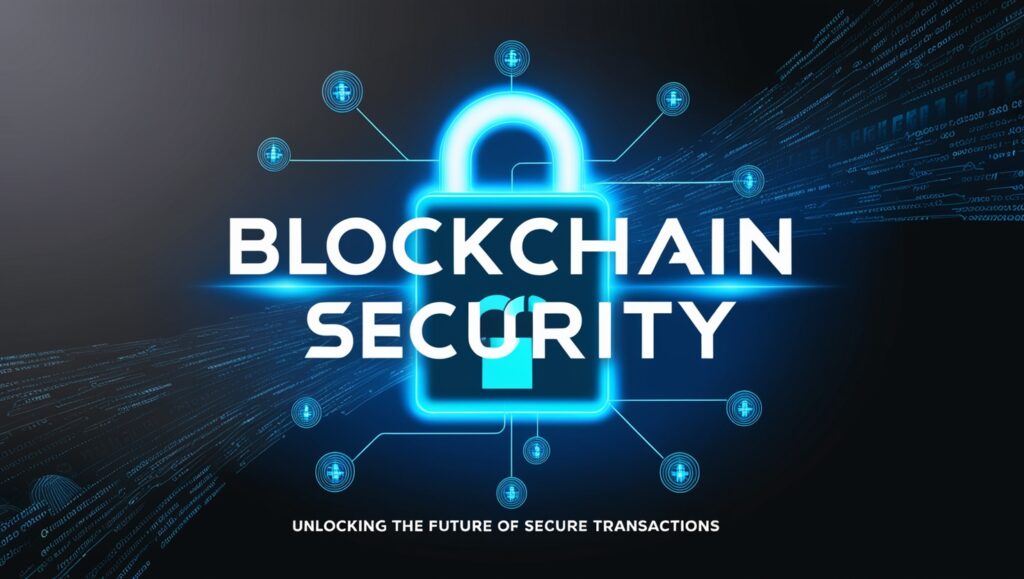Blockchain security has revolutionized the digital world by offering unparalleled security, transparency, and efficiency. However, with great innovation comes significant challenges. This blog delves into the nuances of blockchain security, highlighting its principles, threats, trends, and best practices. Whether you are a blockchain enthusiast or a tech professional, understanding blockchain security is crucial to safeguarding this transformative technology.

1. Introduction to Blockchain Security
Blockchain security refers to the measures and protocols that ensure the safety, integrity, and authenticity of blockchain-based systems. By leveraging decentralized networks, cryptography, and consensus mechanisms, blockchain security minimizes risks like data tampering and unauthorized access.
Blockchain security is essential because the decentralized nature of blockchains does not exempt them from cyber threats. Ensuring robust security is key to fostering trust and driving widespread adoption across industries.
2. Key Principles of Blockchain Security
Blockchain security relies on several foundational principles:
- Decentralization: Unlike centralized systems, blockchains distribute data across multiple nodes, reducing the risk of single-point failures.
- Cryptography: Advanced cryptographic algorithms secure data, ensuring that only authorized parties can access sensitive information.
- Consensus Mechanisms: Protocols like Proof of Work (PoW) and Proof of Stake (PoS) validate transactions, ensuring data integrity and preventing malicious activities.
By adhering to these principles, blockchain systems achieve high levels of security and resilience.
3. Common Blockchain Security Threats
While blockchain security is inherently secure, it is not immune to threats. Common challenges include:
- 51% Attacks: If a single entity gains control of more than half of a network’s computational power, they can manipulate transactions and double-spend.
- Smart Contract Vulnerabilities: Flaws in coding can expose smart contracts to exploits, leading to financial losses.
- Phishing Attacks: Cybercriminals use deceptive techniques to steal private keys and sensitive information.
- Malware: Malicious software can target blockchain networks, compromising their functionality.
Awareness of these threats is the first step toward mitigating them.
4. Techniques to Enhance Blockchain Security
To fortify blockchain security, implement the following techniques:
- Multi-Signature Wallets: Requiring multiple signatures for transactions reduces the risk of unauthorized access.
- Regular Audits: Conducting periodic audits of smart contracts and blockchain infrastructure identifies vulnerabilities early.
- Penetration Testing: Simulating attacks helps organizations understand and patch potential weaknesses.
- Hardware Security Modules (HSMs): These devices safeguard private keys, ensuring secure storage and usage.
Proactively adopting these measures strengthens blockchain security and builds user confidence.
5. Blockchain Security Use Cases
Blockchain security plays a pivotal role across various industries:
- Financial Services: Secure transactions, fraud prevention, and streamlined payments.
- Supply Chain: Enhanced transparency and traceability of goods.
- Healthcare: Protection of sensitive patient data and improved data interoperability.
- Identity Management: Secure storage and verification of digital identities.
These use cases highlight the versatility of Blockchain security in addressing real-world challenges.
6. Emerging Trends in Blockchain Security
The future of blockchain security is shaped by technological advancements and innovative practices:
- Quantum-Resistant Cryptography: Preparing for the potential impact of quantum computing on current cryptographic methods.
- Zero-Knowledge Proofs: Enhancing privacy while maintaining data authenticity.
- Blockchain Interoperability: Securely connecting different blockchain networks to enhance scalability and functionality.
- AI Integration: Leveraging artificial intelligence to detect and respond to security threats in real time.
Staying ahead of these trends ensures a robust and future-ready blockchain ecosystem.
7. Best Practices for Blockchain Security
Adopting best practices is essential for securing Blockchain systems:
- Secure Your Private Keys: Use encrypted storage solutions and avoid sharing keys.
- Update Software Regularly: Ensure all blockchain software is up to date with the latest security patches.
- Educate Users: Promote awareness about phishing and other social engineering attacks.
- Choose Trusted Platforms: Partner with reputable blockchain providers and tools.
By following these practices, you can mitigate risks and enhance blockchain security.
8. Notable Blockchain Security Breaches
Several high-profile breaches underscore the importance of blockchain security:
- Mt. Gox Hack (2014): Over 850,000 Bitcoin were stolen, highlighting the risks of centralized exchanges.
- DAO Attack (2016): A vulnerability in a smart contract led to the loss of $50 million in Ethereum.
- Ronin Network Hack (2022): A breach resulted in $625 million in losses, emphasizing the need for robust bridge security.
Analyzing these incidents provides valuable lessons for strengthening security protocols. Blockchain Security
9. The Future of Blockchain Security
The evolving blockchain landscape demands innovative security solutions:
- Global Regulations: Standardized rules will ensure consistent security practices across jurisdictions.
- Decentralized Identity Systems: Empowering users to control their digital identities securely.
- Layer 2 Solutions: Scaling blockchains without compromising security.
The future of blockchain security lies in collaboration and continuous innovation. Blockchain Security
10. Conclusion
Blockchain security is the cornerstone of trust in decentralized systems. By understanding its principles, addressing threats, and embracing emerging trends, organizations and individuals can unlock the full potential of Blockchain Security. As the digital world evolves, prioritizing blockchain security will remain a critical endeavor.
11. FAQ
Q1. What is blockchain security?
Blockchain security refers to the measures and technologies that protect blockchain systems from unauthorized access, fraud, and attacks.
Q2. Why is blockchain security important?
Blockchain security ensures the integrity and reliability of blockchain networks, fostering trust and driving adoption across industries.
Q3. What are the biggest threats to blockchain security?
Common threats include 51% attacks, phishing, smart contract vulnerabilities, and malware.
Q4. How can I enhance blockchain security?
Adopt measures like multi-signature wallets, regular audits, and secure private key management.
Q5. What is the future of blockchain security?
The future lies in quantum-resistant cryptography, AI-driven threat detection, and decentralized identity systems.
Check More Blog:- https://thetechcrime.com/iot-hacking/
Check My YouTube Chenal:- https://www.youtube.com/@Thetechhacker231

Leave a Reply